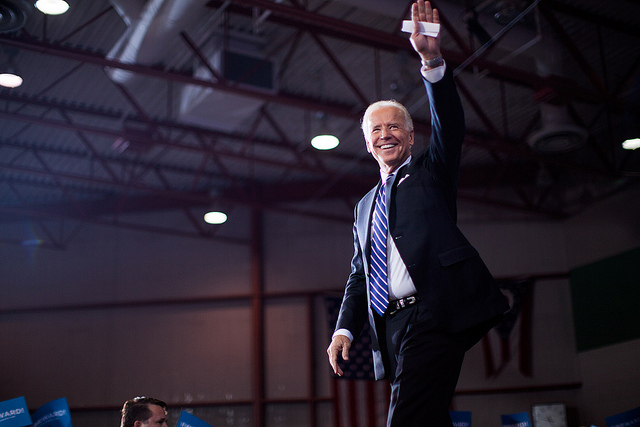Joe Biden on the rebalance
Posted By Rod Lyon on July 23, 2013 @ 14:30
 [1]Late last week US Vice President Joe Biden spoke at George Washington University In Washington DC [2] about why and how the US was pursuing ‘its announced policy of elevated engagement in the Asia Pacific’. If this formulation sounds abstract, that’s because it is. Washington has struggled to find a quick short-hand description of its current Asia policy. It began life as a ‘pivot’, but rapidly morphed into a ‘rebalance’, in part to avoid the connotation that the US was turning its back on other parts of the world. The term ‘rebalance’ endures—and the core elements of the policy show high levels of continuity since its 2011 inception.
[1]Late last week US Vice President Joe Biden spoke at George Washington University In Washington DC [2] about why and how the US was pursuing ‘its announced policy of elevated engagement in the Asia Pacific’. If this formulation sounds abstract, that’s because it is. Washington has struggled to find a quick short-hand description of its current Asia policy. It began life as a ‘pivot’, but rapidly morphed into a ‘rebalance’, in part to avoid the connotation that the US was turning its back on other parts of the world. The term ‘rebalance’ endures—and the core elements of the policy show high levels of continuity since its 2011 inception.
In this speech, Biden outlined the economic and strategic underpinnings for the American decision to direct more resources and attention towards the Asia-Pacific region:
Because imagine what can happen if growing Asia-Pacific middle classes help lift the global economy even more than they already are; if nations reject the temptations of zero-sum thinking and rise peacefully together; if progress toward greater rights and freedoms proves that no country has to make a choice between democracy and development, which is a false choice.
Let me put it slightly differently: Just imagine what will happen if those things don’t come to pass. We’ll all be in a world of trouble.
Biden’s speech is expansive in both objectives and implied policy settings. Defining the Asia Pacific as a region running from India to the Pacific nations of the Americas, he trawls through a disparate range of issues and geographic sub-regions: everything from economic prosperity and engagement with India to territorial disputes, climate change and building a democratic order in the Americas (‘from Canada to Chile’).
That’s not new, though. There’s long been a lot rolled up in the rebalance. President Obama has used it to signal a broad, long-term US commitment to Asia, as he did here in Australia in November 2011. And his first-term National Security Advisor Tom Donilon has previously spoken [3] about the importance of the US role in shaping the norms and rules of an emerging Asian order, a theme that remains a strong one in Biden’s presentation. Essentially the same point can be made about any of the other dominant themes of the rebalance: growing economic cooperation, strengthening regional alliances, ensuring freedom of navigation, building trust between neighbours, and engaging the major regional players. A report by the Congressional Research Service in March 2012 [4] (PDF)—now a little dated but still a good guide to the early US statements about the pivot/rebalance—even suggested that the rebalance was more about a change of means (resources and leadership attention) than a change of policy goals.
Biden’s speech doesn’t often stray into specific strategic commitments, but—as with dogs who don’t bark in the night—it’s important to note what isn’t there. At the grand strategy level, there’s little in the speech to reinforce the notion that the US sees itself being drawn into an inevitable strategic conflict with a rising China.
As well, there’re the obligatory passages that tell other regions of the world that they still command America’s attention. Biden describes Europe as the ‘cornerstone’ of US global engagement. And he assures Middle Eastern countries that the US will still be a key player there because, he tells his audience, that’s what superpowers do—they walk and chew gum at the same time. A lot of the back-end of the speech is about the US; a claim that the US, with its productive workers and questioning of orthodoxy, is ‘back’.
Frankly, Australians need to be realistic about how much US refocusing will occur under the rebalance. More US attention is being lavished on the region, but the Asia Pacific (or Indo Pacific or whatever we want to call it) covers a fantastically large area, even without including the Americas. The sheer scale of the region and the enterprise means that even a superpower can’t be everywhere doing everything at once. If the grandest US objective succeeds—i.e. it builds the rules of the road for the twenty-first century—we’ll all live in a better world. How much ‘rebalancing’ actually needs to occur for Washington to achieve that objective? Biden’s speech doesn’t answer that question. And, to be honest, nobody knows.
Rod Lyon is a non-residential fellow at ASPI and an adjunct associate professor at the Griffith Asia Institute. Image courtesy of Flickr user Barack Obama [5].
Article printed from The Strategist: https://www.aspistrategist.org.au
URL to article: https://www.aspistrategist.org.au/joe-biden-on-the-rebalance/
URLs in this post:
[1] Image: http://www.aspistrategist.org.au/wp-content/uploads/2013/07/8156716546_e2c4253286_z.jpg
[2] spoke at George Washington University In Washington DC: http://www.whitehouse.gov/the-press-office/2013/07/19/remarks-vice-president-joe-biden-asia-pacific-policy
[3] has previously spoken: http://www.ft.com/cms/s/0/4f3febac-1761-11e1-b00e-00144feabdc0.html#axzz2ZkRho9V9
[4] report by the Congressional Research Service in March 2012: http://www.fas.org/sgp/crs/natsec/R42448.pdf
[5] Barack Obama: http://www.flickr.com/photos/barackobamadotcom/8156716546/
Click here to print.